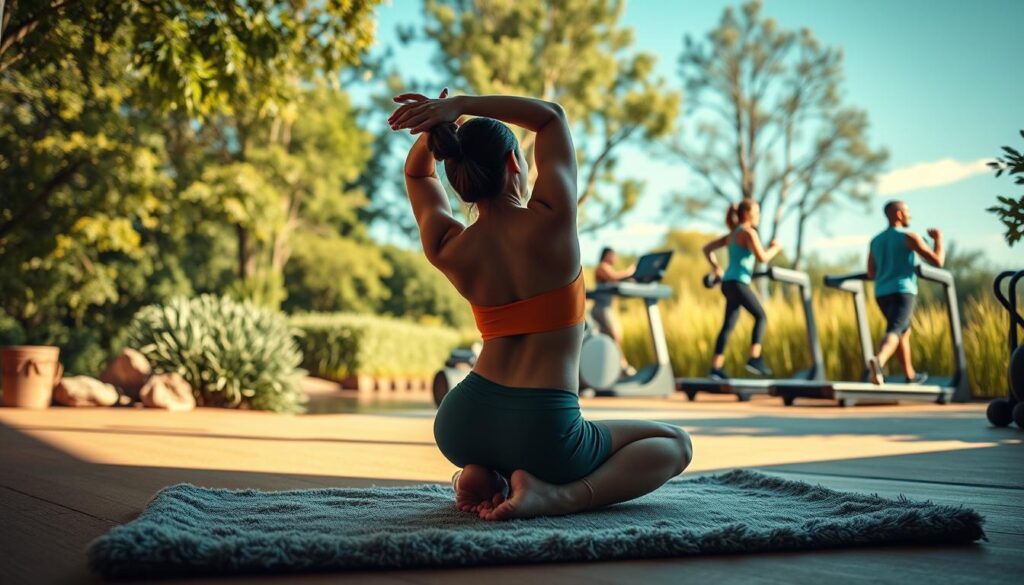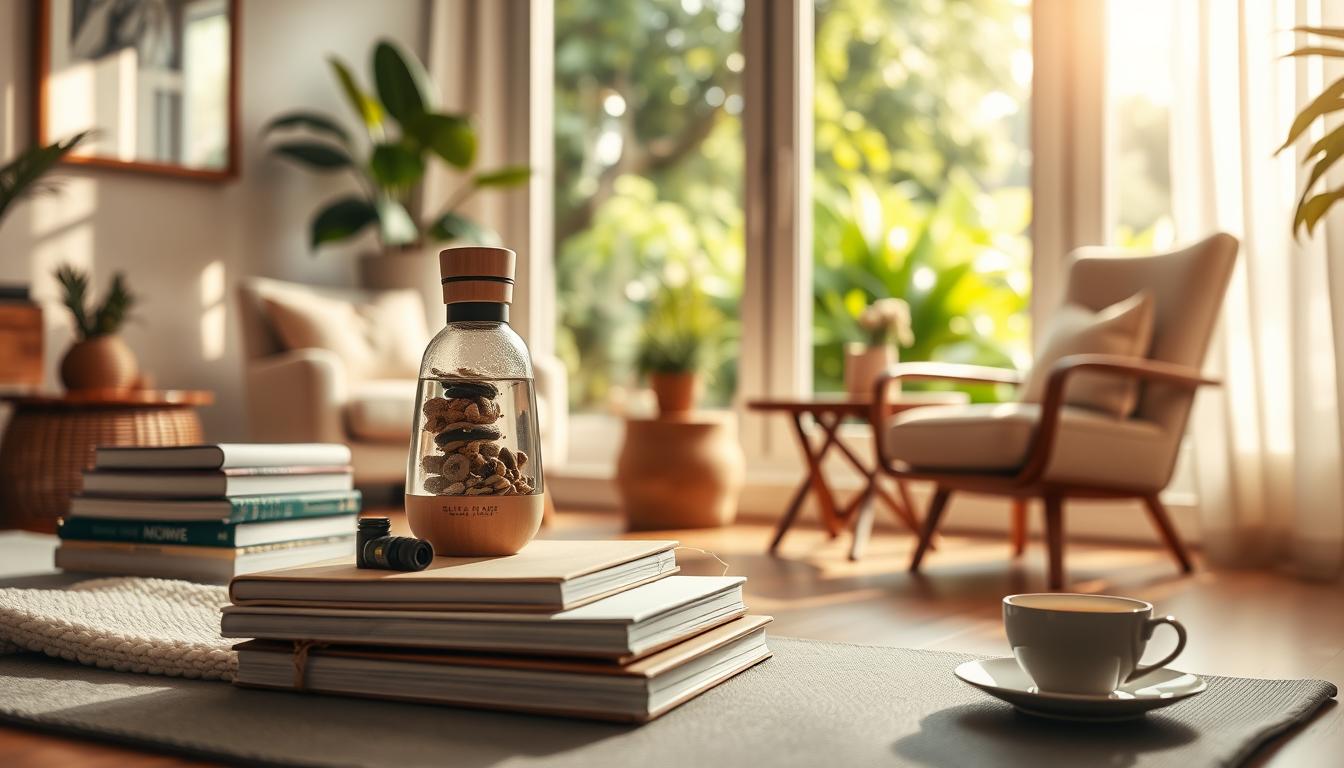Feeling overwhelmed by life’s demands? Imagine making your daily routine better with simple self-care ideas that take just 30 minutes. This wellness challenge isn’t about big changes. It’s about small, consistent actions that can greatly improve your health.
A 30-day self-care challenge offers a clear path to personal growth. Each activity is made to fit into your busy schedule. This means even the busiest people can make time for self-care. These activities help reduce stress, boost happiness, and balance your life.
The beauty of these wellness challenges is their simplicity. Whether you’re working, parenting, or studying, these 30-minute practices fit easily into your day. From quick meditation to mini-workouts, each challenge is a chance to invest in yourself.
Table of Contents
Understanding the Power of Daily Self-Care Practices
Self-care is more than just a buzzword. It’s key to keeping you healthy. The World Health Organization says self-care boosts health, prevents disease, and helps with illness. Adding personal growth to your day can change your life from stressful to balanced.
Benefits of Consistent Self-Care
Regular self-love has big benefits for your mind and body. Here’s what research shows:
- 77% of people feel too busy with responsibilities.
- Those who practice self-care regularly see a 40% drop in stress.
- Self-care can make your brain work better by up to 30%.
Why 30 Minutes is the Sweet Spot
Thirty minutes of self-care can make a big difference. Studies show it can improve your well-being, make you more productive, and lower anxiety. Most people spend less than 30 minutes on self-care each day, making it both achievable and impactful.
Making Self-Care a Priority
Self-care is essential, not a luxury. A survey found 60% think it’s optional, but research shows it’s vital. Just 30 minutes a day of self-care can:
- Lessen stress and anxiety.
- Clear your mind.
- Make you emotionally stronger.
- Make you happier with life.
Good self-care means finding fun, lasting practices for your health. Start small, stay consistent, and see your life change for the better.
Quick Morning Self Care Challenge Ideas
Start your day with mindfulness routines that make mornings a wellness sanctuary. Just a few minutes each morning can lead to lasting positive changes.
Your morning self-care challenge can be simple yet impactful. Try these quick activities that take 30 minutes or less:
- 5-minute meditation to center your thoughts
- 3-point gratitude journaling
- 25 jumping jacks for morning energy
- 15-minute stretching routine
- Hydration with water intake based on body weight
Starting mindfulness routines doesn’t need hours of time. Small, consistent actions create significant transformation. Begin with just 10 minutes of morning practices to build momentum.
| Activity | Time Required | Benefits |
|---|---|---|
| Meditation | 5-10 minutes | Mental clarity, stress reduction |
| Gratitude Journaling | 3-5 minutes | Positive mindset, emotional wellness |
| Morning Stretches | 10-15 minutes | Physical flexibility, energy boost |
Remember, forming healthy habits is about being consistent, not perfect. Pick activities that feel right to you and make them a key part of your morning.
Mental Wellness Activities for Busy Days
In today’s fast world, keeping your mental health up can be tough. But, your mental wellness is important, even when you’re short on time. You don’t need to spend hours on stress-relief techniques. They can be quick, simple, and really help.
With 73% of workers saying flexible wellness options are key for engagement, adding mental health prompts to your daily routine is crucial. Small, thoughtful actions can greatly improve stress and emotional health.
Quick Stress Relief Techniques
Effective stress-relief techniques can be done in just minutes. Here are some quick ones:
- Deep breathing exercises (2-5 minutes)
- Progressive muscle relaxation
- Five-minute meditation
- Mindful walking breaks
Mindfulness Exercises
Mindfulness helps you stay in the present. Studies show meditation boosts brain function and lowers blood pressure. Try these easy practices:
- Breath awareness meditation
- Body scan technique
- Sensory grounding exercise
Emotional Check-ins
Regular emotional check-ins are key. With 8 out of 10 workers hiding their mental health issues due to stigma, it’s important to have personal moments for assessment.
“Your mental health is a priority. Your happiness matters.”
Quick emotional assessment questions include:
How am I feeling right now? What do I need in this moment?
Remember, mental wellness is a journey. Small, consistent steps can lead to big changes in your well-being.
Physical Self Care Challenge Ideas

Improving your physical health doesn’t need long, hard workouts. You can start with simple, quick challenges that fit into 30 minutes. Taking small steps every day can boost your energy and strength.
Find physical self-care activities that fit into your daily life:
- 15-minute home yoga flow
- Quick high-intensity interval training (HIIT)
- Brisk neighborhood walk
- Dance workout in your living room
- Stretching and mobility exercises
Studies show that moving your body can cut stress by up to 60%. Your body wants to move, and these challenges help you connect with it.
Try these fast fitness tips:
- Begin with 10-minute workouts
- Use exercises that don’t need equipment
- Keep track of your progress
- Slowly add more intensity
- Give yourself rewards for sticking with it
Remember, it’s about making progress, not being perfect. Pick activities you like, so self-care becomes a fun part of your day.
Nurturing Creative Expression Daily
Unlocking your creativity is a key way to grow personally. It can change how you practice self-love every day. Studies show that creative activities can lower cortisol by up to 40%. This is a big stress relief for those with busy lives.
You don’t need to be a pro or spend hours to be creative. You can add these exercises to your daily routine:
- Sketch for 15 minutes in a journal
- Write stream-of-consciousness poetry
- Try a new craft or DIY project
- Experiment with digital art apps
- Create a vision board
Using creativity for self-love can bring emotional benefits. Artistic activities help process complex feelings. They offer a way to release stress and anxiety.
| Creative Activity | Time Required | Stress Reduction Potential |
|---|---|---|
| Journaling | 15-20 minutes | 35% reduction |
| Drawing/Painting | 30 minutes | 40% reduction |
| Musical Exploration | 20-25 minutes | 30% reduction |
Remember, creativity is about expressing yourself, not being perfect. Start small, be gentle with yourself, and enjoy the journey of discovering yourself through art.
Self Care Challenge Ideas for Evening Relaxation
Creating a peaceful evening routine is key to managing stress and boosting well-being. Your nighttime self-care can change how you rest and recharge. This sets the stage for better mental and physical health.

Studies show that evening self-care can greatly improve sleep quality and reduce stress. Mindfulness routines in the evening can cut stress by up to 30% and boost relaxation.
Bedtime Rituals to Unwind
- Take a warm bath to lower cortisol levels by 10%
- Practice deep breathing exercises for 5 minutes
- Use lavender aromatherapy to enhance sleep quality by 30%
- Journal for 10 minutes to improve mental clarity
Calming Activities for Stress Relief
Stress-relief techniques don’t have to be complex. Simple activities can greatly impact your evening relaxation:
- Read a book for 20 minutes
- Listen to soothing music
- Practice gentle stretching
- Try progressive muscle relaxation
Sleep Preparation Techniques
| Technique | Benefit | Time Required |
|---|---|---|
| Digital Detox | Improve Sleep Quality | 1 Hour Before Bed |
| Meditation | Reduce Anxiety | 10 Minutes |
| Herbal Tea | Promote Sleepiness | 15 Minutes |
“The best bridge between despair and hope is a good night’s sleep.” – E. Joseph Cossman
By spending just 30 minutes on these evening self-care practices, you can significantly improve your sleep quality. You’ll also reduce stress and wake up feeling refreshed and renewed.
Nutrition and Hydration Self-Care Tasks
Fueling your body with the right nutrients and staying hydrated are key to a holistic lifestyle. Your nutrition and hydration self-care challenge can change your daily routine in just 30 minutes or less.
Starting healthy habits is all about setting simple, achievable goals. The hydration challenge is a great way to improve your health. Try to drink eight glasses of water a day to fight fatigue, brain fog, and unnecessary hunger.
- Track daily water consumption
- Prep nutritious snacks in advance
- Experiment with plant-based meal options
- Reduce processed food intake
Nutrition challenges can be fun and good for you. Try a 30-day plant-based challenge to boost your fiber intake and try new foods. Remember, the goal is progress, not perfection.
| Hydration Goal | Daily Nutrition Target |
|---|---|
| 8 glasses of water | 5 servings of fruits/vegetables |
| Reduce sugary drinks | Limit processed snacks |
| Use a water tracking app | Meal prep weekly |
Batch cooking can revolutionize your nutrition self-care challenge. Spend 30 minutes on the weekend cooking healthy meals for the week. This saves time and ensures you have healthy options always available.
Nutrition is not about perfection, but about making consistent, mindful choices that nourish your body and soul.
Digital Wellness and Mindful Technology Use
In today’s world, managing our digital lives is key for growth and mental health. Digital wellness is a way to use technology that helps us stay mindful and grow personally.
To stay healthy in the digital world, we need smart strategies. Studies show interesting facts about how we use digital tools:
- 70% of people feel too much from constant alerts
- Lowering screen time by 30 minutes can boost sleep by 20%
- Digital breaks can cut stress by about 30%
Screen Time Management
Managing screen time means setting limits and making digital use meaningful. Here are some tips for personal growth:
- Make some areas of your home screen-free
- Track your digital use with apps
- Set times for checking emails and social media
Digital Detox Methods
Digital detox can boost your mindfulness. Experts recommend these methods:
| Detox Method | Benefits | Time Commitment |
|---|---|---|
| Weekly Tech-Free Day | Boosts creativity, lowers stress | 24 hours |
| Evening Digital Shutdown | Better sleep | 2-3 hours before bed |
| Nature Reconnection | Better mental health | 30-60 minutes daily |
Healthy Online Habits
Practicing mindful digital habits changes how we use technology. Intentional consumption means choosing what we see online to help us grow and stay clear-minded.
Digital wellness is not about cutting out tech, but about using it in a balanced, meaningful way.
Connection and Social Self-Care Activities
Social connections are vital for our mental health and self-love. Loneliness is a big problem today. But, making an effort to connect with others can greatly boost our well-being. The U.S. Surgeon General said in 2023 that loneliness is worse for our health than smoking 15 cigarettes a day.
There are many ways to build social connections in just 30 minutes:
- Schedule a quick video call with a friend
- Write personalized messages of appreciation
- Join an online community forum
- Practice active listening with a loved one
- Volunteer for a local community project
“Connection is why we’re here; it is what gives purpose and meaning to our lives.” – Brené Brown
Studies show that strong social bonds can lower stress and boost mental strength. The American Psychological Association found that 66% of people feel they don’t have enough support for stress. So, social self-care is more crucial than ever.
| Social Activity | Time Required | Mental Health Benefit |
|---|---|---|
| Video Call with Friend | 15-30 minutes | Reduces Isolation |
| Online Community Engagement | 20 minutes | Builds Support Network |
| Gratitude Message | 10 minutes | Enhances Emotional Connection |
Social self-care is about quality, not just how much you do. Meaningful interactions that make you feel supported and understood are essential for emotional health and growth.
Creating Your Personal Self Care Challenge Plan
Creating a self care challenge plan needs careful thought and setting achievable goals. Studies show that clear self-care goals can boost sticking to routines by 50%. Begin by figuring out what wellness areas you need to focus on: emotional, physical, mental, spiritual, social, professional, and environmental.
Your self care challenges should match your lifestyle and budget. Since 40% of people do self-care that costs under $10, aim for affordable habits. Pick one self-care activity each week that feels right to you. This keeps things interesting and prevents burnout. Keep track of your progress and celebrate small wins to stay motivated in your 30-day self care challenge.
Remember, 75% of people find it hard to find time for self-care. Try to fit your activities into your daily routine, aiming for 30 minutes a day. Being flexible is important – if something doesn’t work, try something else. Consistent effort can increase the chance of keeping these good habits by 35%.
Be gentle with yourself as you plan. Almost 60% of people feel guilty about self-care, but it’s crucial. By making a plan that fits you, you’re investing in your health. Every step you take is a step towards growth and happiness.
FAQ
What exactly is a 30-day self-care challenge?
A 30-day self-care challenge is a way to focus on your well-being. You spend 30 minutes each day on self-care. It helps you build habits that improve your health in many ways.
How can I find time for a 30-minute self-care routine with a busy schedule?
This challenge is flexible. You can split the 30 minutes into smaller parts during the day. Choose activities that fit your life. Use early mornings, lunch breaks, or evenings to practice self-care.
Do I need any special equipment or skills to start the self-care challenge?
No special equipment or skills are needed. Most activities require little and can be done by anyone. You can start with what you have, like meditation or journaling.
What if I miss a day during the 30-day challenge?
Don’t worry if you miss a day. It’s about making progress, not being perfect. Just start again the next day. Every day is a chance to care for yourself.
Can this challenge help with stress and anxiety?
Yes, it can! The challenge is made to help with stress and anxiety. It includes mindfulness and stress relief. You’ll learn to handle daily life better.
Is this challenge suitable for people of all fitness levels and ages?
Yes, it’s for everyone. You can adjust the activities to fit your needs. It’s designed to be inclusive, so everyone can benefit.
How do I track my progress during the challenge?
Use a journal, app, or checklist to track your self-care. Note how you feel and any improvements. Celebrate your small wins.
What types of activities are included in the challenge?
The challenge includes many activities. These range from mindfulness to creative expression. It covers all areas of wellness, ensuring you’re taking care of yourself fully.
Can I continue these practices after the 30-day challenge?
Yes, you can! The challenge aims to teach you habits for the long term. Many people keep these practices as part of their daily routine.
How do I get started with the 30-day self-care challenge?
Start by choosing activities that appeal to you. Make a plan that fits your life. Begin with small goals. Remember, it’s about caring for your health.

